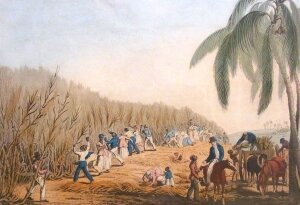JUNE 2014: How Sugar Changed the World

EUROTAST project co-ordinator Hannes Schroeder is speaking at How Sugar Changed the World, a workshop organized by Alex Bentley, Mark Horton and Phil Langton at Bristol University.
The workshop brings together researchers for a discussion of sugar as a food substance that changed the world. Sugar is a key substance in the history of world trade and colonisation, slavery, chronic health problems, and modern cultural norms. Historians, archaeologists, and geneticists come together with nutritionists and health scientists to understand the origins of refined sugar and to document the potentially calamitous way that refined sugar underlies the degenerative “diseases of affluence” such as obesity and diabetes in the Developed world. The evolutionary and historical origins of sugarcane may hold insights into why sugar dominates modern culture.
Dr. Schroeder will be giving a lecture on EUROTAST and a workshop on ancestry and genomics:
EUROTAST – A Marie Curie ITN on the History, Archeology and New Genetics of the Transatlantic Slave Trade
Between the 16th and 19th centuries, over 12 million Africans were kidnapped in Africa and transported to the Americas as a result of the transatlantic slave trade. Traditionally, the study of the transatlantic slave trade has been the domain of historians and – to a lesser extent – archeologists who have contributed much to our understanding of this traumatic period in Atlantic history. EUROTAST is a Marie Curie Initial Training Network, supporting a new generation of science and humanities researchers to uncover and interpret new evidence relating to the history and contemporary legacies of the transatlantic slave trade. The network supports 13 PhD students in history, archaeology, social anthropology and population genetics and encourages them to work collaboratively across disciplines to provide new perspectives on this history. Our research focuses mainly on three themes: Origins, Life Cycles, and Legacies, which we hope will not only lead us to further detail on the slave trading system, but also help us demonstrate how slavery fundamentally shaped the cultural and biological experiences of people of African descent around the world. In this talk, I present some of the research that is being conducted in the network. The project runs until Fall 2015.
Is Oprah Zulu? A conversation on the power of genomics for inferring ancestry and the implications for genealogical research and personalized medicine
Following the completion of the human genome project in 2003 and the introduction of next-generation sequencing technologies two years later, numerous efforts have been made to map human genetic variation across the globe. One of the most striking results of these recent surveys of worldwide genetic variation is that this variation tends to be geographically structured, such that most individuals from the same geographic region will be more similar to one another genetically than to individuals from a distant region. The link between genetic variation and geography means that an individual’s DNA can be used to infer their geographic origin with surprising accuracy, often to within a few hundred kilometers. This new technology has major implications for our ability to trace someone’s genetic ancestry as well as the development of personalized medicine but it is also fraught with difficulties. In this workshop we will explore some of the issues relating to inferring genetic ancestry and its implications for genealogical research and personalized medicine. What do we mean by genetic ancestry? How exactly is it measured? How does our ancestry affect our health? And, most importantly, what can we say and can we not say based on these test results?
